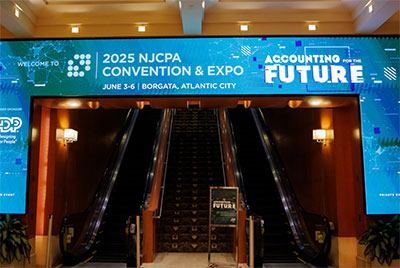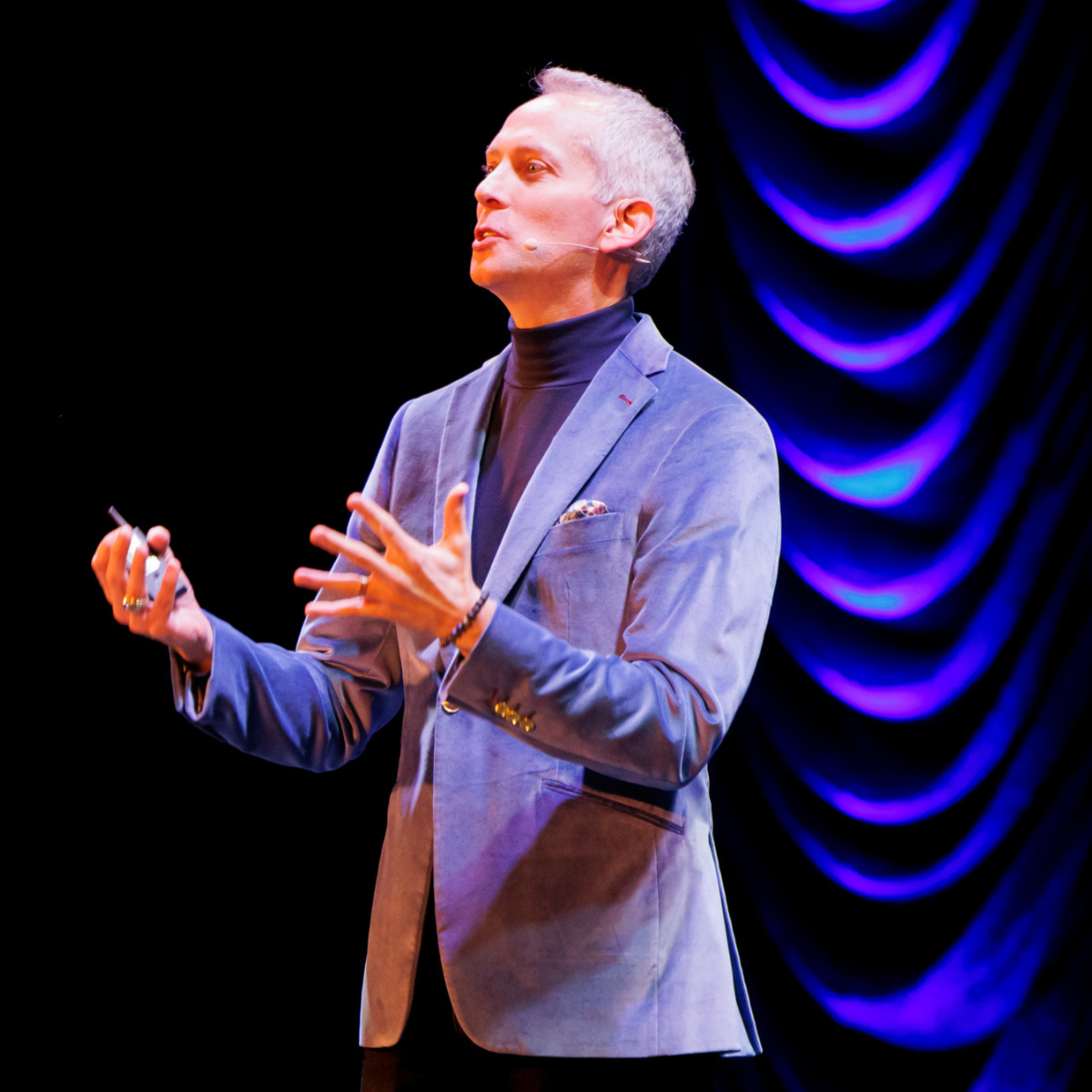NJCPA Convention & Expo Reveals How to Future Proof Careers and Reignite Growth
by Kathleen Hoffelder, NJCPA Senior Content Editor –
June 13, 2025

More than 575 accounting and finance professionals gained exposure to career-altering advice, forward-looking technological/artificial intelligence (AI) strategies as well as some life lessons at the “Accounting for the Future” NJCPA Convention & Expo at the Borgata in Atlantic City June 3-6.
Colleagues shared drinks, laughs and wonders over the four-day event, which featured five keynote speakers, industry breakout sessions, an economic and business roundtable, an emerging leaders’ lunch, networking with more than 80 sponsors and exhibitors, a student track, the Society’s annual business meeting and dinner, and carnival-themed entertainment.
Carving Your Own Path

John Garrett
Author and leadership speaker John Garrett, host of the What’s Your “And?” podcast, showed how important it is to maintain one’s identity outside of accounting and finance roles. “Ninety-two percent of professionals have a passion or hobby outside of work,” he said. “Who you are is so much more than what you do.”
Garrett reminded attendees about the significance of connecting with an organization’s individual employees. Knowing everything about one’s clients and not one’s employees can hurt organizations in the long run. “Your technical skills are 100% replaceable but what’s not replaceable are your unique skills you bring to work,” he said.
Keynote and futurist Crystal Washington, CSP, CPAE, explained the need to future proof one’s business and self by not waiting for change. “We live in a time where we can’t afford to wait for best practices,” said Washington. “Futureproofing yourself not just impacts your team members but future generations,” she added, noting that in life it’s important follow one’s own playbook and “not wait for change to happen.”

Crystal Washington, CSP, CPAE
Ronald J. Baker, CPA, founder of VeraSage Institute, led a breakout showing one of the most prominent examples of not following the pack. In a lesson about Walt Disney, Baker said that innovation can exist among several naysayers. Lessons that Disney can teach organizations include renaming parks to “adventures” and calling customers “guests.” This kind of attention to the end customer proved extremely successful and can be applied to everyday business, he said.
“It wasn’t an amusement park; it was a theme park,” Baker noted. Other than being told something was “too expensive to build and too expensive to operate,” Disney operated by saying, “‘Yes, if…..,’ instead of ‘no because,’” he added. Describing Disney’s plan of adding value or “plussing,” Baker said Disney correctly understood that if “we delight them, they’ll constantly come back.”
Similarly, Thomas W. Metelski, CPA, ACC, CPC, ELI-MP, led a breakout session to help CPAs and accounting professionals innovate and adapt. Two key questions he said attendees need to ask themselves are, “Why as CPAs do we care about innovation and adaptability?” and “How does an organization support innovation and adaptability?” His six-step process to innovate and adapt includes validating one’s values; assessing the current culture; linking values to behaviors; unlocking emotional intelligence; empowering and experimenting; and sustaining with purpose.
In addition, Knowledge Institute speaker and financial consultant Robert Mims, CPA, noted that professionals must not get caught up so much in their own daily functions without understanding the bigger trends that are occurring. In particular, he noted that planning one’s giving should also include nonprofits in addition to relatives, etc. “Baby Boomers have two times the wealth of Gen X,” he said.
Navigating Turbulence
Convention attendees learned how to counter setbacks, both in business and individually, by altering attitudes, strategies and processes. Amelia Rose Earhart, around-the-world pilot and keynote at the Convention, said navigating turbulence often involves creative solutions and finding ways to be tailwinds or helpers to each other. In sharing her story about facing many obstacles in her around-the-world mission, she noted, “the only plan that never experiences turbulence is one that stays locked up in a hangar.”
Attendees and businesses alike will face broader headwinds on the economic front, but there are opportunities for smart money choices, added keynote Gene Marks, CPA, columnist and owner of the Marks Group PC. He said, “2025 will see significant changes in tax law policies that affect your clients and long-term value. Plan on meeting mid-year.”
Several ways organizations can specifically build value right now, he said, is to consider applying for government work contracts; maintain any immigration paperwork, which can be problematic; and specific to succession planning, leverage the value in real estate and be open to employee stock ownership plans (ESOPs).
While mergers and acquisitions present many due diligence and other challenges, CPAs play a pivotal role in their ability to guide clients and their own organizations, according to Jay L. Levine, CPA, partner at Prager Metis and breakout session leader. CPAs, he noted, are critical as strategic advisors on both the buyside and sellside, in financial due diligence in spotting red flags before buyers do and in tax structuring for optimal valuation. Managing the process is like the “dating game,” he said. “They start talking to each other, they find each other and they decide to share information,” added Levine, noting that CPAs should be involved when they start to negotiate terms.
Similarly, staying abreast of cyber and other threats to daily business functions should be a top priority. Keynotes and co-hosts of the “Oh My Fraud” podcast, comedian Greg Kyte, CPA, and Caleb Newquist, editor-at-large at Gusto, told attendees to be diligent in catching fraud. “Good people commit fraud all the time,” said Kyte.